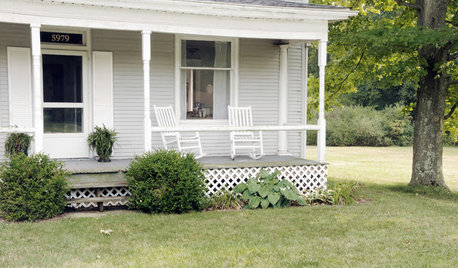rember Its just a question please dont start jumping.
brian_kc0kfg
18 years ago
Related Stories

DECLUTTERING5 Ways to Jump-Start a Whole-House Decluttering Effort
If the piles of paperwork and jampacked closets have you feeling like a deer in the headlights, take a deep breath and a baby step
Full Story
DECORATING GUIDES8 Reasons to Jump Off the DIY Bandwagon
You heard right. Stop beating yourself up for not making stuff yourself, and start seeing the bright side of buying from others
Full Story
LIFEYou Said It: 'Don't Use Your Phone' and Other Tips of the Week
Memorable tips, tricks and quips from around Houzz this week. What are yours?
Full Story
BEFORE AND AFTERSKitchen Rehab: Don’t Nix It, Fix It
A small makeover makes a big impact in a traditional kitchen in Atlanta with great bones
Full Story
HOUZZ TOURSHouzz Tour: A Texas Home Gets a Healthy, Fresh Start
Mold eradication was just the beginning for this Austin family's home on a creek bed — toxins of all kinds now don't make it past the door
Full Story
HOUZZ TOURSMy Houzz: It All Started With a Rug
One floor covering from Kazakhstan inspires a whole global vibe in a traveler’s San Francisco apartment
Full Story
MOST POPULAR10 Things to Ask Your Contractor Before You Start Your Project
Ask these questions before signing with a contractor for better communication and fewer surprises along the way
Full Story
DECORATING GUIDESHow to Decorate When You're Starting Out or Starting Over
No need to feel overwhelmed. Our step-by-step decorating guide can help you put together a home look you'll love
Full Story
ORGANIZING4 Questions to Help You Organize Your Favorite Photos
Organize your keeper photos with a system that's just right for you, whether it's in the cloud or you can hold it in your hand
Full Story
LIFE9 Ways to Appreciate Your House Just as It Is
Look on the bright side — or that soothingly dark corner — to feel genuine gratitude for all the comforts of your home
Full Story





flowerfarmer
neil_allen
Related Professionals
Norfolk Landscape Architects & Landscape Designers · Comstock Park Landscape Architects & Landscape Designers · Sahuarita Landscape Architects & Landscape Designers · Alexandria Landscape Contractors · Surprise Landscape Contractors · Gloucester Landscape Contractors · La Verne Landscape Contractors · Las Vegas Landscape Contractors · Louisville Landscape Contractors · Muttontown Landscape Contractors · New Brighton Landscape Contractors · Nutley Landscape Contractors · Salem Landscape Contractors · Wilsonville Landscape Contractors · Oxon Hill Landscape Contractorsflowerfarmer
brian_kc0kfgOriginal Author
bluestarrgallery
Jeanne_in_Idaho
flowerfarmer
bluestarrgallery
Jeanne_in_Idaho
Miss EFF
tastefullyjulie
flowerfarmer
spivey13
flowers4u
bryan_ut
Irish_Eyes_z5